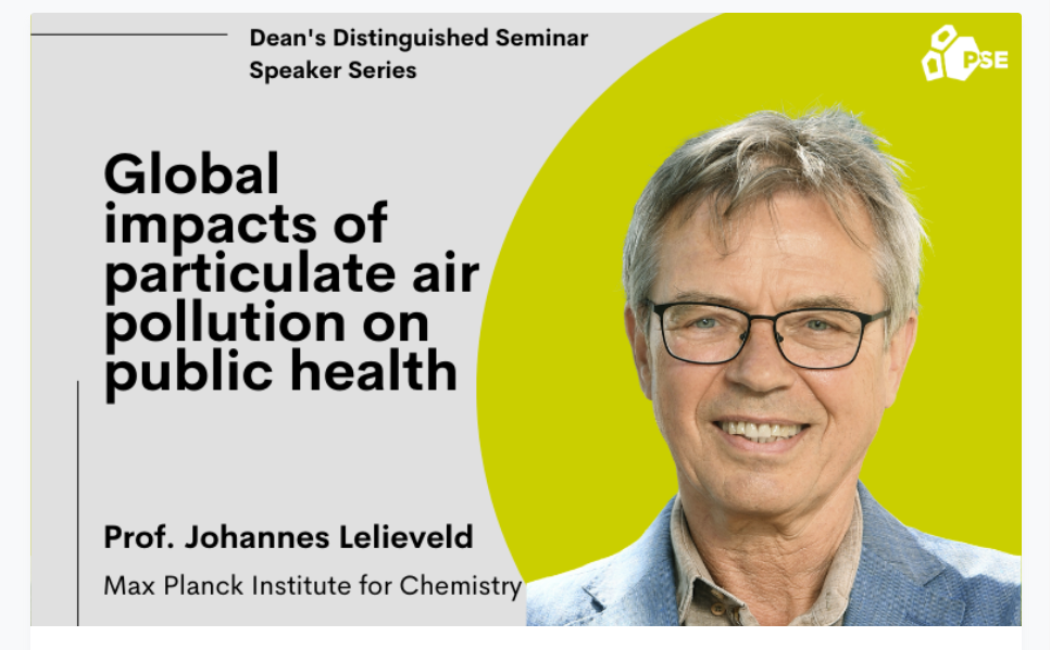
Global impacts of particulate air pollution on public health
Meeting URL: https://kaust.zoom.us/j/96275972695?from=addon
Meeting ID: 962 7597 2695
Abstract
Long-term exposure to fine particulate matter (PM2.5) poses a main public health risk. Our group has developed a data-informed global atmospheric model to compute the exposure to particle concentrations attributed to different source categories. We apply exposure-response functions to assess the health burden, including excess mortality. It appears that black carbon and anthropogenic organic aerosols are more harmful than other PM2.5 constituents, related to their high oxidative potential upon inhalation. Considering that these species may be about twice as hazardous as other PM2.5 compounds, domestic energy use emerges as a leading cause of mortality attributable to PM2.5, notably in Asia and Africa, while in Europe, America and the Middle East, the use of fossil fuels predominates. Recently, we computed the global concentrations of ultrafine particles (UFP, <0.1 µm) at high spatial resolution (10km). UFP are of special interest, as they can translocate into the bloodstream and trigger systemic inflammatory responses, important for cardiovascular disease. From the global exposure to UFP we estimated the cardiovascular disease incidence. Preliminary results indicate that a large fraction of cardiovascular disease, previously attributed to PM2.5, may actually result from UFP. Globally, the mean loss of life expectancy from air pollution surpasses that of many known health risk factors, such as infectious diseases and is comparable to that of tobacco smoking.
References
[1] S. Chowdhury et al., Global health burden of ambient PM2.5 and the role of anthropogenic black carbon and organic aerosols. Environ. Int. 159, 107020 (2022).
[2] M. Kohl et al., Numerical simulation and evaluation of global ultrafine particle concentrations at the Earth’s surface. Atmos. Chem. Phys. (2023), https://egusphere.copernicus.org/preprints/2023/egusphere-2023-317/.
[3] J. Lelieveld et al., Loss of life expectancy from air pollution compared to other risk factors: a worldwide perspective. Cardiov. Res. 116, 1910-1917 (2020).
[4] A. Pozzer et al., Mortality attributable to ambient air pollution: a review of global estimates. GeoHealth 7, e2022GH000711 (2023).
Bio
Jos Lelieveld has a PhD in atmospheric physics from the University of Utrecht, the Netherlands. He develops methods to identify and attribute air pollution to natural and anthropogenic sources, their role in climate change, and public health. He is the director of the Max Planck Institute for Chemistry in Mainz, Germany. He is also a professor at the University of Mainz and the Cyprus Institute, and additionally holds honorary professorships. He (co)authored more than 500 scientific publications. He is an associated editor of three scientific journals and a member of German and Chinese Academies of Science. He received an Advanced Research Grant from the European Research Council and many international distinctions, including an honorary doctor degree and awards by the American Geophysical Union for “Outstanding contributions to the understanding of atmospheric chemical processes”, and the European Geosciences Union for “Eminent and diverse scientific contributions and international leadership in atmospheric research”. The Web of Science and Google Scholar list him as a highly cited researcher.
Speakers
Professor Johannes Lelieveld
Max Planck Institute for Chemistry, Mainz, Germany
